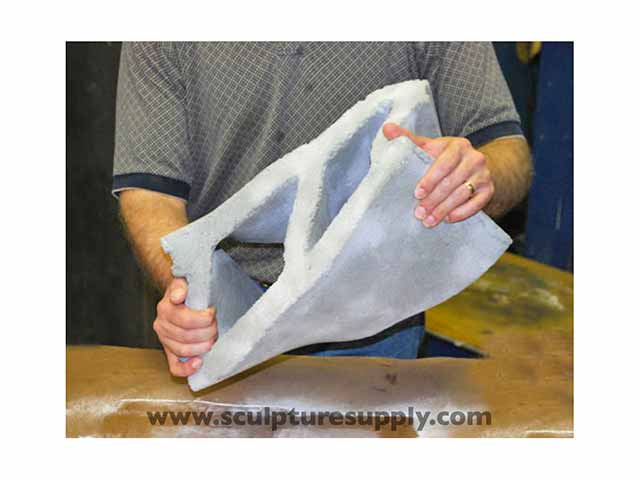Description
| Unit Size | Net Weight |
| Pint Kit | 2.13 lb |
| Gallon Kit | 17.1 lb |
FlexFoam-iT 7FR certifies to FMVSS 302 Flame Specification. This foam is self-extinguising. FlexFoam-iT 7FR is a premium quality water blown flexible foam that can be used for a variety of industrial, special FX, arts and crafts projects. SO-Strong colorants may be added for coloring effects. Part A & B liquids are combined, mixed, and poured into a mold or other form (apply release agent if necessary). Mixture will rise and cure quickly to a solid, flexible foam.
FLEXFOAM-iT EXPANSION RATES


Properties
Technical Properties
| Mix Ratio by Weight | 100A:88B |
| Mix Ratio by Volume | 1A:1B |
| Pot Life | 35 seconds |
| Tack Free Time | 60 minutes |
| Cure Time | 2 hours |
| Color | White |
| Mixed Viscosity | 1,000 cps |
| Specific Volume | 229 cu. in./lb. |
| Specific Gravity | 0.11g/cc |
| Expansion (Approx.) | 8 times |
| Foam Density | 7 lb./cu. ft. |
Certifies to FMVSS 302 Flame Specification
HELPFUL TIPS FOR CASTING FLEXFOAM-iT URETHANE EXPANDING FOAMS:
Thorough pre-mixing of both Part"A" and Part"B" in their original containers prior to measuring out. Specifically, failure to pre-mix Part"B" prior to dispensing will cause the ingredients in the system to remain unbalanced. Storing and working with materials in cold environments will cause the components of Parts "A" and "B" to separate (i.e. vinegar and oil). If these components are not brought back to proper room temperature and reconstituted this will cause failure in their cross-linking when mixed together.
Thorough mixing of Part"A" and Part"B" combined.
Once combined together, Part"A" and Part"B" must be evenly and thoroughly blended scraping both sides and bottom of the mixing container. A double-mix pour technique, time allowing depending on product blended pot-life, will assist in the most successful mixing technique. Often with the foams, users will work quickly as materials generally have a short pot-life before expansion occurs and neglect a thorough mixing procedure.
Use of silicone-based release agents in molds where foams are cast, will cause collapse of the foam cell structure.
Mold configuration; if the mold is 'closed' and not capable of allowing gas to escape during the expansion & cure process of the foam, the de-molding procedure will result in the gases escaping from the cured foam causing collapse of the casting. Using a mold where the gases are allowed to escape during cure is important.
If the casting comes out of the mold collapsed; often it can be compressed which will cause it to re-inflate.
Cold molds can also contribute to foam collapse; sometimes materials will be kept at proper temperature, however, if the material is poured into a cold mold, that may cause cure-issues and collapse of the foam casting.
Thorough pre-mixing of both Part"A" and Part"B" in their original containers prior to measuring out. Specifically, failure to pre-mix Part"B" prior to dispensing will cause the ingredients in the system to remain unbalanced. Storing and working with materials in cold environments will cause the components of Parts "A" and "B" to separate (i.e. vinegar and oil). If these components are not brought back to proper room temperature and reconstituted this will cause failure in their cross-linking when mixed together.
Thorough mixing of Part"A" and Part"B" combined.
Once combined together, Part"A" and Part"B" must be evenly and thoroughly blended scraping both sides and bottom of the mixing container. A double-mix pour technique, time allowing depending on product blended pot-life, will assist in the most successful mixing technique. Often with the foams, users will work quickly as materials generally have a short pot-life before expansion occurs and neglect a thorough mixing procedure.
Use of silicone-based release agents in molds where foams are cast, will cause collapse of the foam cell structure.
Mold configuration; if the mold is 'closed' and not capable of allowing gas to escape during the expansion & cure process of the foam, the de-molding procedure will result in the gases escaping from the cured foam causing collapse of the casting. Using a mold where the gases are allowed to escape during cure is important.
If the casting comes out of the mold collapsed; often it can be compressed which will cause it to re-inflate.
Cold molds can also contribute to foam collapse; sometimes materials will be kept at proper temperature, however, if the material is poured into a cold mold, that may cause cure-issues and collapse of the foam casting.
Media
Documentation
Special Order Items
PRODUCT ADVISORY:
The products listed below are currently SPECIAL ORDER items and require pre order.
Lead times may vary - For more information please contact our staff.
799902 - Flex Foam-iT 7 Flame Resist - Gallon Kit
799903 - Flex Foam-iT 7 Flame Resist
The products listed below are currently SPECIAL ORDER items and require pre order.
Lead times may vary - For more information please contact our staff.
799902 - Flex Foam-iT 7 Flame Resist - Gallon Kit
799903 - Flex Foam-iT 7 Flame Resist
Related Products
Payment & Security
Your payment information is processed securely. We do not store credit card details nor have access to your credit card information.

